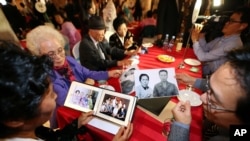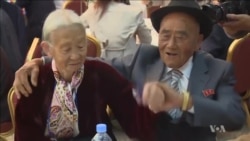Hundreds of South Koreans have crossed the border into North Korea for the second round of family reunions this week, connecting families separated for six decades by the political division resulting from the Korean War.
Some 250 South Koreans, mostly elderly, passed through an immigration office at the heavily fortified border Saturday before boarding buses that will take them to a resort for closely monitored meetings with their long-lost relatives. The family members will have 12 hours together, broken into short sessions.
Reunion participants are expected to avoid controversial topics, such as politics. The Korean Red Cross, which helped organize the reunions, has also warned the South Koreans not to criticize North Korea.
First round
On Tuesday, nearly 400 South Koreans arrived in North Korea for the first round of reunions, carrying gifts of warm clothes and cash to give to their North Korean relatives.
A fleet of buses following a convoy of black sedans flying Red Cross flags stopped at the high-security checkpoint in the South Korean town of Goseong, before crossing the heavily-fortified border on their way to the North Korean resort of Mount Kumgang, where the reunions are being held.
Millions of Koreans were displaced and separated from family members during the 1950-'53 war that ended in an uneasy truce between the communist North and democratic South.
WATCH: Related video report by Brian Padden
The reunions are the 20th of their kind since a historic inter-Korean summit in 2000, but just the second one in five years, and only after the two sides reached an agreement in August to ease rising tensions that had pushed them to the brink of another armed conflict.
Long waiting list
The reunions were suspended in 2010 after North Korea fired artillery shells at a South Korean border island, and Pyongyang cancelled reunions planned in 2013 at the last minute after claiming Seoul was trying to overthrow North Korea's government. There was concern that this reunion would be canceled after Pyongyang indicated it would launch a long-range rocket during its recent ruling party anniversary celebration.
In addition to the face-to-face reunions, thousands of other Koreans have been reunited by video.
More than 65,000 South Koreans are on a long waiting list to see their long-lost relatives, many of them in their 80s and 90s. Neither Pyongyang nor Seoul will allow their citizens to exchange phone calls or letters with relatives on the opposite side of the border.







